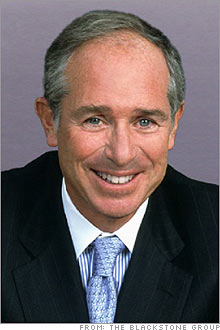More sugar for SchwarzmanBlackstone's IPO was even sweeter for its founders than you thought, says Fortune's Allan Sloan.(Fortune Magazine) -- We'd all love to find an Uncle Sugar to fork over the dough we need to pay the income taxes we owe Uncle Sam. For most of us, alas, finding such a sugar daddy (or mommy) is only a pleasant fantasy. But Steve Schwarzman and Pete Peterson, the zillionaire co-founders of the Blackstone leveraged-buyout house, have realized that dream. The two amigos, who knocked down a combined $2.6 billion by selling part of their Blackstone stake in the firm's recent IPO, stand to get cash payments that will cover most of the $400 million of capital gains taxes they owe Uncle Sam. Guess who their benefactor is. Give up? It's none other than the newly public company Blackstone Group LP (Charts).
No, this isn't yet another screed about how people who run LBO and hedge-fund firms are dodging taxes - the issue du jour in Washington. It's about how Blackstone's partners - and, it turns out, partners in some other financial houses that have gone public or plan to - have cut sweet deals for themselves with their public firms. Here goes. Schwarzman, Peterson, and Blackstone's other partners got $4.7 billion in the IPO, and thus owe $700 million of gains taxes to Uncle Sam. (That's 15% of the $4.7 billion pocketed by all Blackstone partners, not just Schwarzman and Peterson.) However, for reasons we'll get to in a while, the selling B-Stoners stand to collect $1 billion in cash over 15 years from a "tax receivable" given to them by the public Blackstone. That's in addition to the cash they realized from the IPO. Those billion tax-receivable bucks are equivalent to only about $400 million of after-tax dollars today because the payments are taxable (oh, the irony!) and take years to collect - but it's still major money. What a joy to have a public company give you a tax-related bennie worth more than half what you owe the IRS from an offering that turned you from mega-wealthy into mega-mega-wealthy. Blackstone, in its post-IPO quiet period, declined comment, so I made assumptions and calculations on my own. (See my math in the box below.) Having a newly public company give its tax savings to its original owners seems, shall we say, a bit strange. But the technique has been around for years. To pick just one example, General Electric (Charts, Fortune 500) did that when it spun off its Genworth financial services subsidiary in 2004. There are numerous other examples. So why am I focusing on Blackstone? Because it's so big and so prominent and seems so focused on having its partners (not to be confused with its public investors) make out at the expense of everyone else. Besides, Schwarzman, proving the truth of the adage that the whale that comes to the surface gets harpooned, was strutting around until shortly after my Fortune colleagues crowned him King of Wall Street. Here's how the whales did it. By shuffling lots of paper, Blackstone Group LP - remember, that's the public company - set up a wholly owned corporation that created a very large asset (called goodwill, if you really want to know) that's tax deductible over 15 years at the 35% corporate rate. The public Blackstone agreed to give Schwarzman, Peterson, and the other sellers 85% of what it realizes from this deduction. Kicking back 85% of the tax savings to the sellers dates to at least 2005, when Lazard and DreamWorks both did it, as did Fortress earlier this year. But outside of tax techies, almost no one noticed. Now this 85%-to-the-sellers deal, which is perfectly legal but in my opinion shorts the public shareholders, has become standard for "alternative investment" firms seeking to go public while they can. Offerings I've read that do this include KKR, Och-Ziff, and Pzena, with more doubtless to come. Back to Blackstone, whose tax goodie for the selling partners is worth $750 million to $800 million after taxes over 15 years. Take the midpoint and translate it into current dollars, and you get about $400 million. The bottom line: The public company is giving Blackstone's selling partners more than half their $700 million capital-gains tab, reducing their tax outlay to 7%. That, fans, is an example of why Steve Schwarzman is worth around $10 billion. And why most of the rest of us aren't. From the August 6, 2007 issue
|
Sponsors
| ||||||||||||||||


